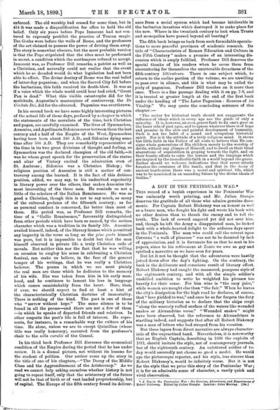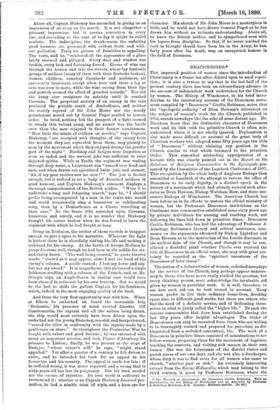A BOY IN THE PENINSULAR WAR.*
THIS record of a boyish experience in the Peninsular War was eminently worth printing, and Mr. Julian Sturgis deserves the gratitude of all those who admire genuine docu- ments. For Captain Robert Blakeney was an honest as well as a brave man, who fought his fight and wrote his book with no other desires than to thrash the enemy and to tell the truth. The lack of reward angered yet did not sour him. and, though he left the Army a disappointed man, he looked back with a whole-hearted delight to the arduous days spent in the Peninsula. The man who could call the retreat upon Corunna "a walk of pleasure" was not to be daunted by lack of appreciation, and it is fortunate for us that he sent in his papers, since to his retirement at Zante we owe as gay and spirited a narrative as we have seen for years.
But let it not be thought that the adventures were hastily jotted down after the day's fighting. On the contrary, the book is the deliberate and conscious result of literary effort. Robert Blakeney had caught the mannered, pompous style of the eighteenth century, and with all the simple soldier's unskilled ambition to write he weighted his phrases too heavily for their sense. For him wine is "the racy juice," while women are naught else than "the fair." When he leaves the city's dissipation for the high road he declares, of course, that "love yielded to war," and once he so far forgets the duty of the military historian as to declare that the ships crept "along the scarcely ruffled surface of the waters like wounded snakes or Alexandrine verse." "Wounded snakes" might have been observed, but the reference to Alexandrines is startling indeed, and suggests that after all Robert Blakeney was a man of letters who had strayed from his vocation.
But these lapses from direct narrative are always character- istic of the unpractised hand. Nevertheless, it is noteworthy that an English Captain, describing in 1836 the exploits of 1811, should imitate the style, not of contemporary journals, but of the eighteenth century. An unlettered soldier of to- day would assuredly not choose so good a model. He would ape the picturesque reporter, and his style, less sincere than Robert Blakeney's, would be infinitely worse. But it is not for the style that we prize this story of the Peninsular War; it is for an admirable sense of character, a rarely quick and vivid observation.
• A Roy in the Peninsular War : the Services, Adventures, and Experiences of Robert Mahoney. Edited by Julian Sturgis. London, John Murray. (16a.)
Above all, Captain Blakeney has succeeded in giving us an impression of an army on the march. It is not altogether a pleasant impression, but it carries conviction in every line, and according to the cant of to-day it might be called realistic. The indiscipline, the drunkenness, the unfailing good humour, are presented with evident truth and with- out palliation. Truly his picture of Bembibre is appalling. The town, said he, "exhibited all the appearance of a place lately stormed and pillaged. Every door and window was broken, every lock and fastening forced. Rivers of wine ran through the houses and into the streets, where lay fantastic groups of soldiers (many of them with their firelocks broken), women, children, runaway Spaniards and muleteers, all apparently inanimate, except when here and there a leg or arm was seen to move, while the wine oozing from their lips and nostrils seemed the effect of gunshot wounds." Nor did the army ever recapture its sobriety until it reached Corunna. The perpetual anxiety of an enemy in the rear produced the pitiable result of disobedience, and neither the stately reproof of Sir John Moore nor the sturdy punishment meted out by General Paget availed to restore order. In brief, nothing but the prospect of a fight seemed to steady this valiant army, and no sooner was the battle over than the men relapsed to their former carelessness. "How little the minds of soldiers on service," says Captain Blakeney, "are occupied with thoughts of the enemy from the moment they are separated from them, may plainly be seen by the merriment which they enjoyed during the greater part of the night." Hardship and fatigue were forgotten as soon as ended, and the sorriest joke was sufficient to raise dejected spirits. While at Tarifa the regiment was wading through deep water, a Lieutenant was "soused over head and ears, and when drawn out ejaculated 'twixt joke and earnest, Ah, if my poor mother saw me now !' " The jest is foolish enough, but it sufficed to set a body of drenched soldiers in good humour, and Captain Blakeney's comment displays a thorough comprehension of the British soldier. "Were I to undertake a long and fatiguing march," says he, "I should prefer being accompanied by a man in the ranks who would and could occasionally sing a humorous or exhilarating song, than by a Demosthenes or a Cicero travelling at their ease." So the brave 28th retreated upon Corunna, humorous and unruly, and it is no wonder that Blakeney thought his career broken when he was forced to leave the regiment with which he had fought so long.
Being an Irishman, the author of these records is braggart enough to give a spice to his narrative. Wherever the fight is hottest there he is cheerfully risking his life and making it awkward for the enemy. At the battle of Arroyo Molinos he jumped a stone wall, though he had been in the saddle for six- and-thirty hours. "The wall being crossed," to quote his own words, "absurd as it may appear, alone I met the head of the enemy's column. A scuffle ensued ; I lost my horse and cap but not my sword." It is magnificent, this picture of a single Irishman scuffling with a column of the French, and, as Mr. Sturgis says, an Anglo-Saxon in similar case would have been shamed to reticence by his own bravery. But we would be the last to chide the gallant Captain for his frankness, which, indeed, is the most engaging quality of the book.
And from the very first opportunity was with him. When at fifteen he embarked on board the mercantile brig 'Britannia,' his presence of mind averted disaster. Off Combemartin, the captain and all the sailors being drunk, the ship would most certainly have been driven upon the rocks had not the young Blakeney, sea-sick and inexperienced, "moved the tiller in conformity with the signals made by a gentleman on shore." So throughout the Peninsular War he fought with valour and good fortune ; be was entrusted with many an important mission, and took Prince d'Arenberg his prisoner to Lisbon ; finally, he was present at the siege of Badajoz, "where valour's self," he says, "might stand appalled." Yet after a quarter of a century he felt driven to retire, and he intended his book for an appeal to his Sovereign and his country. The appeal is made too late ; if he suffered wrong, it was never repaired, and a wrong that is sixty years old has lost its poignancy. But his book needed not the excuse of injustice. Its own merit is sufficient to recommend it ; whether or no Captain Blakeney deserved pro- motion, he had a nimble trick of style, and a keen eye for character. His sketch of Sir John Moore is a masterpiece in little, and he could not have drawn General Paget as he has drawn him without an intimate understanding. Above all, he knew the British soldier, and he sympathised even with his lapses from discipline. So that, if he never reached the rank he thought should have been his in the Army, he has, forty years after his death, won an unexpected honour in the field of literature.







































 Previous page
Previous page